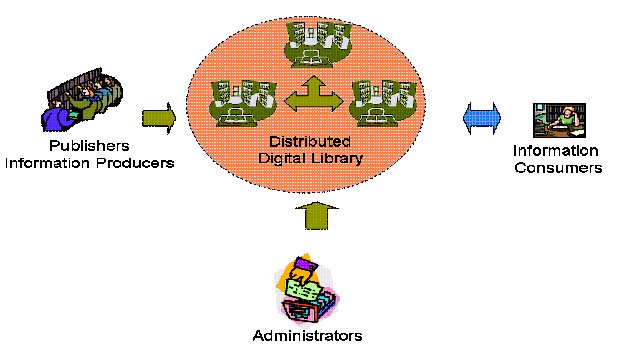Digital Libraries
MECCA uses state of the art digital library technology for
asynchronous information delivery possibly in a self paced
manner that complements in-class instruction. Specifically,
digital library technology supports the MECCA eLearning infrastructure.
The following figure presents to use of digital library technology
for educational content management.
The image shows the stakeholders in information production
and consumption, and namely information providers, which can
include instructors, information consumers, which can include
both instructors and learners, and repository administrators,
who are responsible for the organization of content in a manner
that allows straightforward discovery and efficient delivery,
even from a distance.

One thing to consider is who is actually a producer of information.
In the more traditional way of thinking, information producers
are experts, for example instructors, that develop content
and feed it to consumers. A more modern approach acknowledges
the fact that all users in a community, both experts and novices,
can exchange valuable information. This is very common on
the Internet, where peers answer each other’s questions.
This is concept is played in the above image, which shows
that the traditionally defined information consumers can also
be information producers.
The following digital library technology aspects are used
in the MECCA eLearning man-agement infrastructure:
- Heterogeneous content management (i.e. audio, video, images,
and text)
- Metadata-based descriptions of educational entities
- Metadata-based queries
- Text-based searching
- Distribution of metadata and content for scalability with
respect to content volume and number of organizations connecting
into a wider digital library network
- Autonomy of participating organizations
- Distributed queries
- Synchronization of distributed metadata management repositories
- Single point of access to distributed content
- Support of metadata standards, namely the Dublin Core
|

